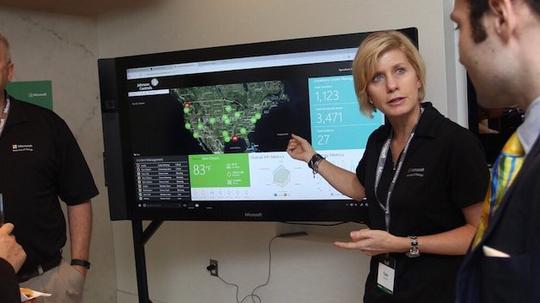
Every two years, Microsoft hosts a TechFair at their downtown D.C. Innovation & Policy Center, demonstrating what Microsoft researchers have been working on — like an elementary school science fair, but for grownups. Hundreds of guests walked through the open house-style fair to watch as different researchers explained projects covering everything from Artificial Intelligence to Big Data.
This year's fair showcased 12 research projects, most of which revolved around one key question: How can tech help address societal issues?
All 12 projects focused on one of three trends: (1) The intersection between tech and nature, (2) Using tech to innovate medicine and (3) How AI can facilitate and optimize cognitive services.
(1) Tech and Nature: Microsoft, appropriately, called these projects, "Natural Interactions: Beyond Science Fiction." Digital tattoos and talking plants — yup, talking plants — showcased where technology can elevate natural processes. DuoSkin takes wearable tech to the next level. The metallic tattoos, made with a conducive material, gold leaf, can connect to phones via Bluetooth to send communications, detect touch, and change color. A keyboard tattoo, for example, could potentially play music when touched. Music festivals, like Coachella, could use the tattoos as on-skin festival passes, as sensors or nearby readers register each guest when they come in.
Project Florence, is named after the project's subject: a talking plant, named Florence. Researchers connected the plant to sensors, which detect what they called, "the plant's mood." By reading pH levels, for example, sensors will be able to tell if the plant is thirsty or tired. Those who want to chat type a message into a computer, which sends a signal back to the plant. Nice messages generate a red light, which she likes, and negative ones send a blue light, which she doesn't. She responds accordingly, and a printer types her message out within seconds.
(2) Medical Innovations: Using AI, Project Hanover is revitalizing the way doctors assess treatment options for cancer patients. According to the Microsoft researchers, there are 4,000 to 5,000 medical research papers published online every day. The Hanover research team developed a way for machine learning and AI to extract the relevant information out there, potentially identifying new drug treatments or combinations for doctors to evaluate.
Project Premonition uses smart technology to detect pathogens in mosquitoes before they cause outbreaks. The machines are placed in mosquito-heavy environments and designed to evaluate which mosquitoes would make for good study subjects. The technology, which has so far been set up in the Florida Keys and around the Houston area, traps certain mosquitoes, tracks their personal and environmental data, like where they've likely been or what time they arrived to that area, and eventually enables more efficient and detailed genome sequencing. The technology could eventually help fight mosquito-borne diseases, such as Zika.

(3) AI and Cognitive Services: Of course, no 2017 tech fair would be complete without a great big serving of brand new AI applications. Microsoft demonstrated how they've easily added AI capabilities to almost any application, from language transcription and translation to customer service to video tagging.
The Microsoft Translator eliminates any sort of language barrier by providing real-time transcription and translation. For example, imagine if a Japanese-speaking tourist needs information from an English-speaking concierge. The tourist could speak into his or her phone, while the concierge's computer transcribes the words in real time, straight back into English.
With the AI-Powered Customer Service app, Microsoft researchers showed how AI can optimize customer service departments, with bots taking the lead in online chats. Other apps, like video tagging, allows users to upload certain videos and the software will monitor changes in sentiment throughout. If someone uploads a political campaign speech, for example, the AI software will detect positive reactions within the audience, versus negative ones.
Image Credit: Laurence Genon




